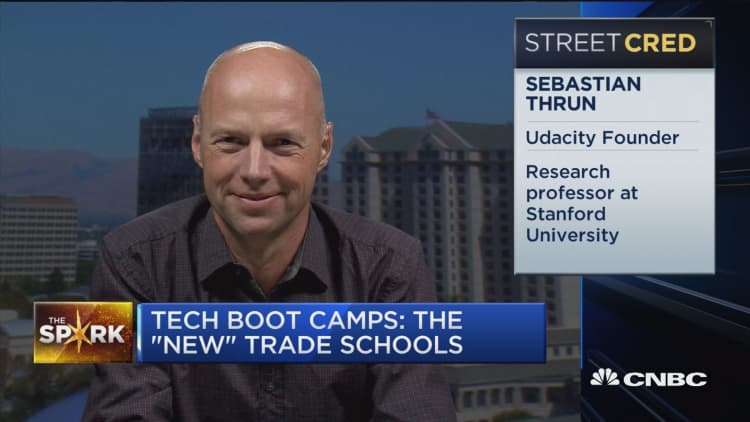
As technology evolves and employees search for workers with the appropriate set of skills, schools focused primarily on technology have emerged as the new trade schools.
A trade school, defined as a vocational or technical school to teach a specific skill set, has traditionally taught crafts like electrical repair or carpentry work to people seeking out those careers. Now, with a heightened focus on technology, many Americans are turning to tech as a trade to learn specific skills that range from coding to virtual reality.
It's the idea of getting a "micro-credential," or training that leads to employment in a specialized field. The trend is moving to fill a void left by students who graduate from college without technology-specific degrees: According the National Science Foundation, a mere 32.6 percent of all four-year degrees awarded are science and engineering-related.
'You just have to be good at it'
Research analyst Trace Urdan of Credit Suisse says the micro-credential phenomenon is gaining steam, and employers are now getting smarter in understanding which skills they really require of their employees.
"Every business is a tech business now," Urdan told CNBC. "The obvious case of a micro-credential is coding. You just have to be good at it."
Udacity is one of many education providers hoping to meet that particular skill gap. The company focuses on courses that teach students how to become engineers of self-driving cars and developers of virtual reality platforms. Company founder Sebastian Thrun told CNBC he's seeing a mix of students come to the program — which include beginners, life-long learners and those who are shifting careers.
"In most cases these companies pay us for these employees to teach, and the reason is that Silicon Valley is actually really desperate to find good talent," Thrun, an adjunct computer science professor at Stanford University, told CNBC's "Closing Bell" recently.
Virtual reality "is one of the hottest fields, so is self-driving cars," he said. "I can probably find you 10,000 VR jobs right now in [Silicon] Valley. Every company that makes media has to gear up to VR right now."
Ricardo Parker, founder of the virtual reality focused Chronos Global Academy, told CNBC that tech trade schools are challenged with the task of staying current with fast paced changes in technology. In a quest to stay relevant, he said, Chronos updates its curriculum every six months or so.
"The main courses that we offer are where students come in with no knowledge of virtual reality development," Parker said. "After six weeks or 40 hours of working with us, they walk away being able to create an app or experience with virtual reality."
As the micro-credentialing trend grows, some evidence suggests college students are slowly getting hip to the trend by adding specific courses to their workload.
Tom Gimbel, founder and CEO of staffing and recruiting firm LaSalle Network, says he's finding many college students tacking on a second major, such as computer science or applications development. But for those who are not as ambitious, he said, tech boot camps can help them catch up.
Still, Gimbel notes that while growing in popularity, these boot camps are not on the path to replace more conventional vocational trades.
"There's still a very big career path with traditional trade schools," he said. "There are always going to be people out there seeking traditional blue-collar trade jobs."
Figures from the Bureau of Labor Statistics show the job outlook of software developers is growing at a rate faster than average, with a 17 percent projected increase in employment from 2014 to 2024. This is higher than the average increase for all occupations within that time frame — 7 percent.
Likewise, computer and information tech jobs are projected to grow 12 percent between 2014 and 2024, the bureau notes, due to a higher demand for mobile and cloud computing. Experts say that has broad implications for the economy.
"If there is demand for a skill and it doesn't exist, that's a problem. It's a missed opportunity," said Veronique de Rugy, senior research fellow at the Mercatus Center at George Mason University. "When you actually have more of these skills available, you are able to unleash more economic growth."
— CNBC's Melody D. Myers contributed to this report


